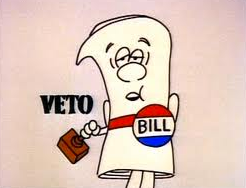Governor Dayton says he will veto any medical marijuana proposal unless legislators can reach a compromise with law enforcement group lobbyists. The Associated Press reports:
Dayton repeatedly cites law enforcement concerns for his own opposition to medical marijuana. But in an interview today with the Associated Press, the Democratic governor says he’d probably sign a bill to legalize it if sheriffs, prosecutors and other law enforcement groups get behind it.
I support and admire this Governor, so let me say this as politely as I can: Sir, may I please inquire as to WHAT ARE YOU SMOKING?
Governor Dayton, with all due respect, lobbyists were not on our election ballots. You were. Minnesota citizens didn’t give any lobbyists the most powerful tool in a democracy, the veto. We collectively gave it to you, because we can hold you democratically accountable when we disagree with you. We can’t do that with unelected, unaccountable lobbyists.
 We voted for duly elected lawmakers to compromise with other duly elected lawmakers. The Governor and legislators should certainly be informed by lobbyists on all sides of the issue, but the veto power shouldn’t effectively be handed to lobbyists, as Governor Dayton is doing on the medical marijuana issue.
We voted for duly elected lawmakers to compromise with other duly elected lawmakers. The Governor and legislators should certainly be informed by lobbyists on all sides of the issue, but the veto power shouldn’t effectively be handed to lobbyists, as Governor Dayton is doing on the medical marijuana issue.
Unfortunately, this is not all that uncommon in Minnesota State government. From the left, education reforms too often don’t get a fair debate if the teacher’s union lobbyists turn their mighty thumbs downward. From the right, tax reform has become the impossible dream because a bevy of business lobbyists are effectively given a collective veto.
Too often, legislators aren’t crafting legislative compromises inside legislative hearing rooms and chambers. Instead the compromises are being formulated by the most politically powerful lobbyists in hallways and bars, and are then rubber stamped by legislators eager to please the lobbyists who decide which legislative candidates’ campaign war chests get filled.
I’m not a simplistic lobbyist basher. Lobbyists are here to stay, and that’s actually a very good thing. Though campaign finance laws should limit their influence on the electoral process and less powerful interests need to have better access to lobbyists of their own, I know lobbyists can improve the legislative decision-making process with the specialized information that they bring.
Moreover, I’m not convinced the law enforcement position is all that unreasonable. My understanding is that they could accept a proposal in which the active ingredient in marijuana (THC, Delta-9-Tetrahydrocannabinol) is delivered to patients through pills, oils and vapor. Their concern apparently is with allowing patients to smoke unprocessed leaves, either home grown or commercially grown, because they think having more legal leaves floating around Minnesota would make it more difficult to enforce criminal marijuana laws. Though I support decriminalizing recreational use of marijuana, I am encouraged that law enforcement isn’t saying “never” to these patients. And they certainly have a right to their position.
But they don’t have a right to veto.
So, Governor, please do what we elected you to do. Do the hard work of listening to all sides of the medical marijuana issue, and negotiating with them. At the end of those negotiations, let us know whether YOU believe there is a reasonable policy position, and explain YOUR reasoning for YOUR decisions.
